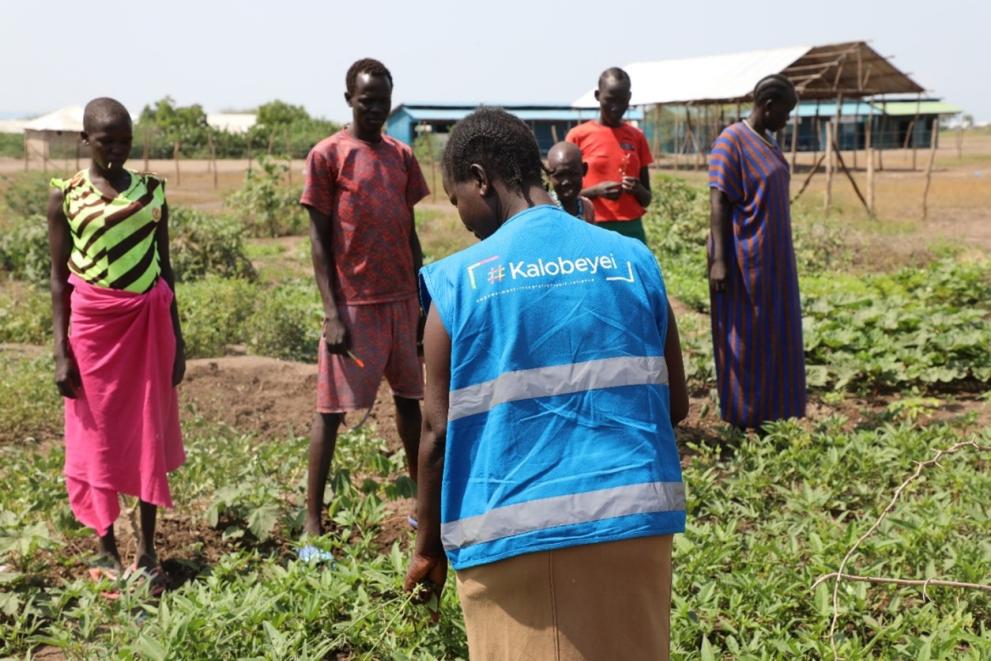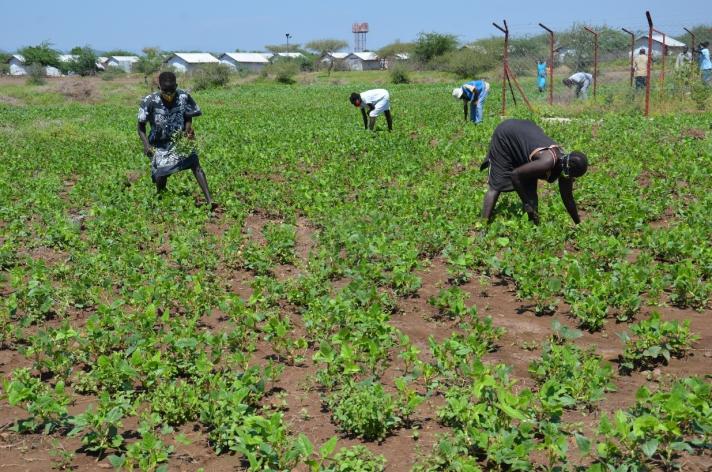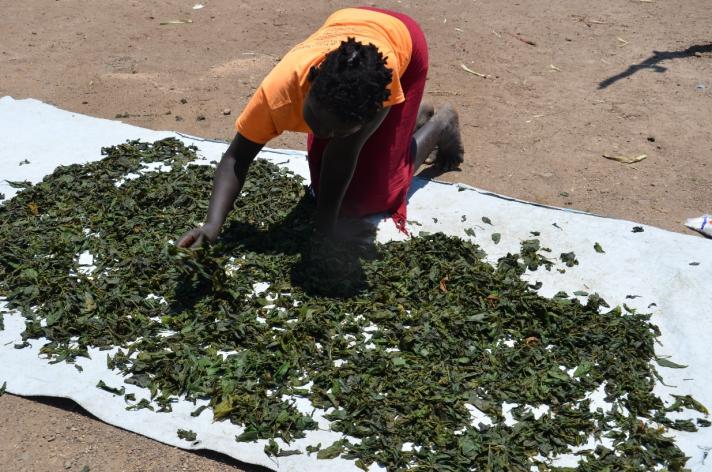
Building Resilience through Horticulture and Open-field Cropping
In Kalobeyei Integrated Settlement, there are two forms of crop production that refugees and host community farmers engage in. These are horticulture productions that use shade-netted farms with drip irrigation systems and open-field cropping, which is dependent on rain. However, many refugees prioritize kitchen gardening in the Kalobeyei settlement, using the backyards and open spaces surrounding clusters of households to produce faster-maturing crops for household use and surpluses for the market. Vegetables grown help supplement and enrich family diets, attract income through sales, and minimize cases of nutrition deficiencies.
Originally reliant on food aid as their primary source, refugees now find that this support is dwindling due to the increasing refugee population and decreasing donor funding. The food rations provided are not enough to meet the dietary needs of households. In response, development partners have proposed several solutions to increase household food baskets, with a strong emphasis on promoting self-reliance. This approach empowers refugee households to cultivate their sustainable solutions for their food, income, and nutrition security needs. The introduction and expansion of self-reliance initiatives, especially through the EUTF funded programme Kalobeyei Integrated Socio-Economic Development are encouraging refugee households to embrace agriculture in their homes and other designated places within the settlement. Using waste kitchen water and rain, households produce their own food, enriching their diets while minimizing expenses.
Turkana County situated in Kenya's dryland areas, is plagued by extreme hunger and poverty, significantly affecting the well-being of the population. The region faces heightened vulnerability due to prolonged droughts and erratic rain seasons. Despite these challenges, Turkana, especially the areas hosting refugees, i.e., Kakuma and Kalobeyei, remain relatively peaceful. Adequate security levels facilitate communities’ integration, making it possible for them to coexist and participate in socioeconomic transformative interventions. The commitment of the Kenyan government, civil society, and donor community is pivotal in addressing food production and access challenges, maximising the available agricultural opportunities driving household towards achieving food security.
The role of Community facilitators - the story of Grace
Grace is one of the 56 Community-Based Facilitators (CBFs) trained by FAO. The EUTF funds the Enhancing Self-Reliance for Refugees and Host Communities in Kenya (ESRH) project, implemented by FAO, which aims to enhance the self-reliance of refugees and host communities through better management and protection. Community facilitators help FAO make sure that the project's work in crop production, agribusiness, and agri-nutrition benefits different groups of project beneficiaries.
“Education enables households to provide for themselves” Grace states.
Following her FAO provided Farmer Field School (FFS) training, Grace returned to Kalobeyei settlement to identify the most food-insecure households, enrolling 180 initially and expanding to 360 households in 2023 into 10 groups according to their crop preferences. Under the guidance of Grace, they learn on a weekly basis about various topics related to crop production and management, marketing, food consumption, and many cross-cutting issues such as nutrition, HIV AIDs, Gender Based Violence (GBV), Behaviour change, and alternative livelihoods among others.
“I want every household in Kalobeyei to have a kitchen garden, grow their own vegetables, and eat healthy foods. This is the campaign I carry with me every day,” says Grace.
The realisation is that households recognise the need to expand their food basket by exploring alternative food sources and income streams. The household's food and dietary needs cannot be satisfied solely by relying on food assistance. Through participation in learning activities provided by FFS methodology, refugees are increasing their knowledge and skills in agriculture, especially the establishment and management of kitchen gardens. Refugees from different countries working together in groups are building integration and cohesion among themselves. Each household now understands the importance of producing their own food, with a variety of vegetables providing nutrition, thereby reducing cases of acute malnutrition, particularly among children under 5.
Agri-nutrition practical involving food preparation and preservation are increasing awareness and skills about the dangers of poor nutrition, as well as the benefits of managing scarce food resources in refugee households. Given the unpredictable nature of Turkana's rains, households utilize the rains to enhance the productivity of their backyard gardens. During dry periods, households employ dryland farming technologies, like Zai pits and hanging gardens, which are more water efficient. The ability created for households to understand the food security context of Kalobeyei and appreciate the opportunities available and the roles they can play to meet their household’s food, income, and nutrition needs is strengthening community resilience.
The goal is self-reliance, where households sustainably supplement food assistance with home-grown food. Grace mentors new community facilitators and works together with them to expand kitchen gardening in Kalobeyei, encouraging more to produce their own food at home, on shade-netted horticultural farms, and in open field areas of Kalobeyei.
Details
- Publication date
- 26 June 2024
- Author
- Directorate-General for International Partnerships
- Region and Country
- Horn of Africa
- Kenya
- Thematic
- Improved migration management
- Strengthening resilience of communities
- Partner
- Food and Agriculture Organization


